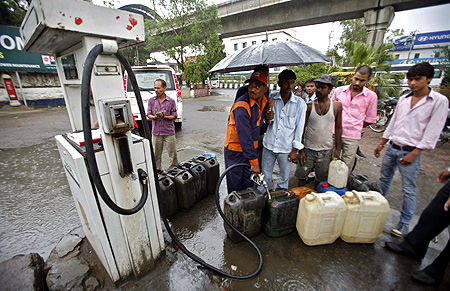 International rating agency Moody's Investors Service, which has a Baa3 stable rating on the country, on Tuesday said the diesel price deregulation announced over the past weekend is "credit positive".
International rating agency Moody's Investors Service, which has a Baa3 stable rating on the country, on Tuesday said the diesel price deregulation announced over the past weekend is "credit positive".
In a note issued from Singapore, its senior vice-president for sovereign risk group Atsi Sheth said, "The decision to fully deregulate diesel prices signals fiscal discipline on the part of the sovereign, which we view as credit positive. "Diesel price deregulation will reduce the subsidy burden for the government, although fiscal savings are likely to be limited."
Last Saturday, the government linked the retail price of diesel by slashing prices up to Rs 3.77 a litre. Diesel price was cut after a gap of over five years.
She said the government decision to fully liberalise diesel prices and ease controls over natural gas prices, allowing the latter to increase by about 33 per cent, are credit positive.
This is because they allow the market to adjust to global commodity price trends and reduce the exposure of government finances to those trends, she said.
"Our stable outlook on the sovereign is based on our expectation of incremental credit positive policy changes in multiple areas over the coming months, and our assumption that the fuel subsidy reforms, which were introduced some years ago, will continue," Sheth said.
It can be noted that since September 2012, the government has implemented various reforms to the fuel subsidy programme, including allowing oil companies to increase diesel prices incrementally by 50 paise a month, withdrawing the subsidy on diesel sold in bulk, and limiting subsidised consumption of cooking gas.
Despite these steps, rising commodity prices actually led to a significant increase in the subsidy outlay, she said, adding in fact, the oil subsidy bill grew nearly six-fold over the past five years to Rs 85,500 crore (Rs 855 billion) in FY14, from Rs 15,000 crore (Rs 150 billion) in FY10.
Total fuel subsidies accounted for less than 1 per cent of GDP and under 3 per cent of total government expenditures in FY14.
Global crude prices have fallen by over 20 per cent in the second half of 2014, making it an opportune time to liberalise fuel prices.
The country, being a heavy net importer of energy, with crude oil making up around 30 per cent of imports in FY14, lower crude prices ease pressure on the current account.
It also reinforces the current disinflationary trend in headline CPI growth, providing room for subsidy reforms, sheth said. "Implementing reform at a time of low global oil price reduces the potential for inflationary pressures from a jump in domestic fuel prices.
"Moreover, petroleum products have a small weight in the country's consumer price basket and we therefore expect energy product price liberalisation to have a benign impact on CPI inflation," Sheth added.
She also said lower oil prices are also likely to benefit the country's macroeconomic balance. Diesel price deregulation was accompanied by a 5.7 per cent drop in diesel prices, further mitigating the potential inflationary impact of subsidy reform.
However, she warned that "a future rise in diesel prices could contribute to food inflation (or the food subsidy bill) as companies begin to charge more for freight transportation services, and the cost of fuel-intensive machines used for the production of wheat increases.
"Policies to address supply constraints by improving agricultural productivity could, however, mitigate some of the potential pass-through effects of fuel price liberalisation on food inflation," she said.


.jpg)








 © 2025
© 2025